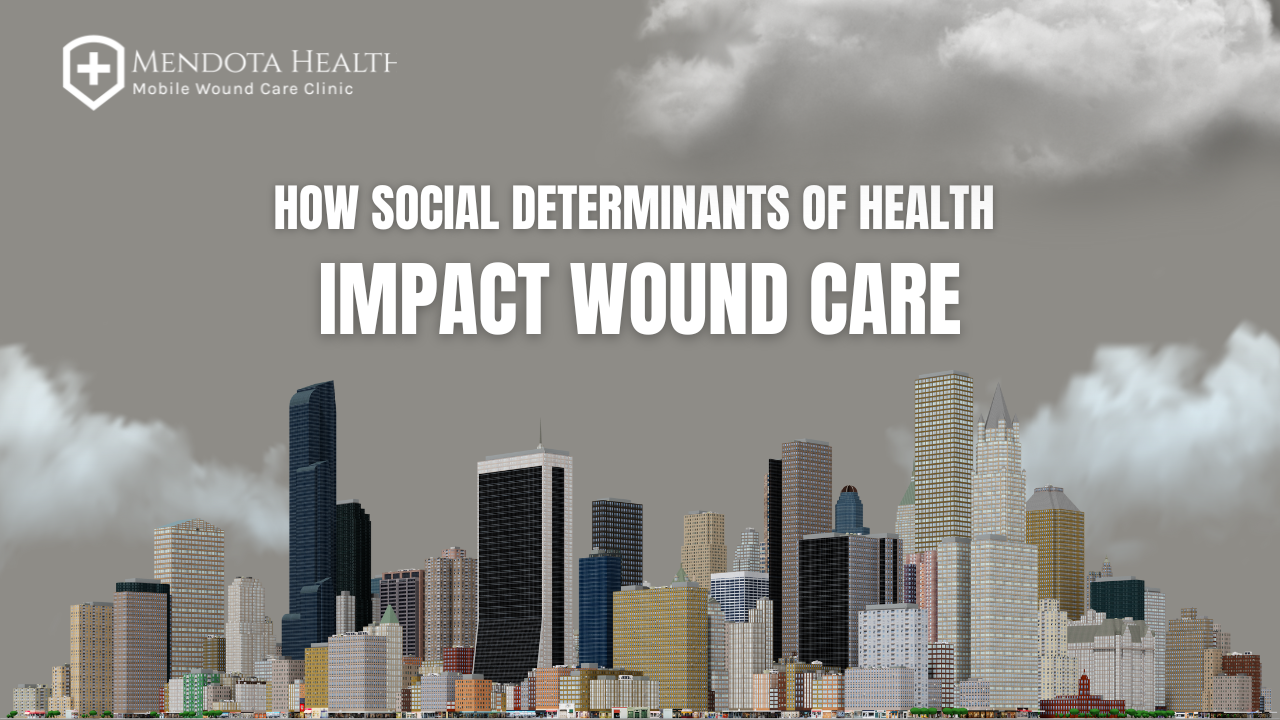
22 Aug How Social Determinants of Health Impact Wound Care
Healthcare has been constantly evolving to meet the ever-changing needs of individuals and communities. One transformative trend is the integration of healthcare services into people’s homes. By bringing healthcare to their doorstep, we can effectively tackle the root causes of health disparities and address the social determinants of health.
Social determinants of health encompass a wide range of factors that influence a person’s overall well-being and life expectancy. These factors include economic stability, education, access to healthcare, social and community support, and the physical environment. Research has consistently shown that these determinants have a significant impact on a person’s health outcomes, often outweighing the influence of medical care alone.
Wound care is a critical aspect of healthcare that goes beyond the physical healing of injuries. It involves a complex interplay of medical treatment, environmental factors, and individual circumstances. The impact of social determinants of health on wound care is a crucial yet often overlooked aspect of healthcare delivery.
The Connection Between Home-Based Wound Care and Social Determinants
Enhancing Access to Healthcare: One of the most critical barriers to healthcare access is the distance between individuals and healthcare facilities. For those living in rural or underserved areas, traveling to a healthcare facility can be time-consuming, expensive, or even impossible. By offering medical services at home, we eliminate geographical barriers and ensure that everyone has equal access to quality care.
When wounds occur, delayed access to medical care can lead to complications, infections, and prolonged healing times. Lack of transportation, financial constraints, and geographic distance can all impede timely wound assessment and treatment, affecting the overall healing process.
Education and Health Literacy: Adequate wound care requires proper education and understanding of wound management techniques. Individuals with limited health literacy might struggle to comprehend wound care instructions, leading to improper dressing changes, neglecting signs of infection, and delayed seeking of medical attention. Lack of education can result in non-adherence to treatment plans, exacerbating wound-related issues.
Physical Environment: The living conditions and physical environment can impact wound healing. Overcrowded living spaces, poor sanitation, and inadequate ventilation can increase the risk of infection and hinder the healing process. Environmental factors, such as exposure to pollutants or allergens, can complicate wound care and lead to poor outcomes.
Social Support: Strong social support is essential for optimal wound care. Individuals lacking a robust support system might struggle to manage wounds effectively. Tasks such as wound dressing changes or maintaining hygiene can become challenging without assistance. Social isolation can also contribute to psychological stress, which in turn affects the body’s ability to heal.
Nutrition and Food Insecurity: Adequate nutrition is critical for wound healing. Individuals facing food insecurity might not have access to balanced diets rich in essential nutrients. Poor nutrition can lead to delayed wound healing and weakened immune responses, making the body more susceptible to infections.
Bridging the Gap: Strategies for Comprehensive Wound Care
Mobile Wound Care: Mendota Health’s mobile wound care clinic reaches those who face geographical barriers. Because our providers are in the patient’s home setting, they are able to address environmental barriers to proper wound healing.
Health Education: Tailored education focused on the types of wound care techniques our providers are using, helps patients understand the importance of participating in the process and empowers them to follow wound care instructions.
Collaboration and Partnerships: We collaborate with primary care physicians, vascular surgeons, home health nurses, family caregivers, and others to ensure patients are receiving the holistic care they need to heal. These types of partnerships can lead to comprehensive wound care plans that incorporate social support, transportation assistance, and access to affordable supplies.
Integrated Care Approach: Being in the patient’s home setting allows our providers to understand the social determinants impacting wound care and tailoring treatment plans to individual circumstances.
Wound care is more than just medical treatment; it is a holistic endeavor influenced by social determinants that shape individuals’ lives. Recognizing and addressing these determinants can pave the way for improved wound care outcomes. By implementing targeted strategies and fostering collaborations, healthcare systems can bridge the gap between medical treatment and the social realities that impact wound care, ensuring that all individuals have the opportunity to heal optimally, regardless of their socioeconomic backgrounds.

